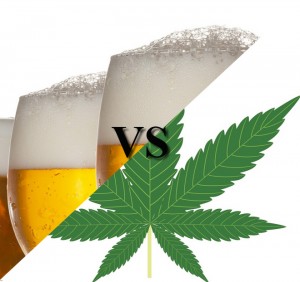 The study found that for high school seniors, alcohol consumption led to unsafe driving and compromised relationships with peers, while marijuana consumption was found to compromise relationships with authority figures
The study found that for high school seniors, alcohol consumption led to unsafe driving and compromised relationships with peers, while marijuana consumption was found to compromise relationships with authority figures
Growing public support for marijuana legalization in the U.S. has led to public debate about whether marijuana is “safer” than other substances, such as alcohol. In January, President Obama also publically stated he is not convinced that marijuana is more dangerous than alcohol. Despite the recent shift in views toward marijuana, the harms of use as compared to alcohol use are not well understood.
Now a new study “Adverse Psychosocial Outcomes Associated with Drug Use among US High School Seniors: A Comparison of Alcohol and Marijuana,” by researchers affiliated with New York University’s Center for Drug Use and HIV Research (CDUHR) published in the American Journal of Drug and Alcohol Abuse, (on-line ahead of print) September 1, 2014, analyzed data from a nationally representative sample of high school seniors in the Monitoring the Future (MTF) study. MTF is a nation-wide ongoing annual study of the behaviors, attitudes, and values of American secondary school students. Students were asked to indicate whether they experienced various adverse psychosocial outcomes resulting from use of each substance. The authors analyzed data from 7,437 students (modal age: 18) from cohorts assessed from 2007 through 2011 who reported using alcohol or marijuana in their lifetime.
“The paucity of research is of particular public health concern as alcohol and marijuana are the two most commonly used psychoactive substances among adolescents,” said Joseph J. Palamar, PhD, MPH, a CDUHR affiliated researcher and an assistant professor of Population Health at NYU Langone Medical Center (NYULMC). “Nearly half of high school seniors have used marijuana in their lifetime and over two-thirds have used alcohol, but few studies have compared adverse psychosocial outcomes of alcohol and marijuana directly resulting from use.”
The most alarming finding was that alcohol use was highly associated with unsafe driving, especially among frequent drinkers,” said Dr. Palamar. “Compared to non-drinkers, frequent drinkers were over 13 times more likely to report that their alcohol use has led to unsafe driving. Marijuana users, compared to non-users, were three times more likely to report unsafe driving as a direct result of use.”
The researchers also found that alcohol use was more commonly reported to compromise relationships with friends and significant others (e.g., boyfriends); it was also reported to lead to more regret, particularly among females. Marijuana use on the other hand was more commonly reported to compromise relationships with teachers or supervisors, result in less energy or interest, and result in lower school or job performance.
Females in particular were more likely to report engaging in behaviors they regretted after using alcohol. They were also more likely than males to report feeling less emotionally stable, and not being able to think as clearly due to alcohol use. White students were more likely to report various adverse outcomes resulting from alcohol use such as engaging in behavior that one regrets, inability to think clearly, and driving unsafely. Interestingly, researchers found that both frequent and infrequent marijuana users were more likely to report no adverse outcomes associated with marijuana use.
“Not unexpectedly, we found that the higher the frequency of use, the higher the risk of reporting an adverse outcome,” said Dr. Palamar. “In particular, the relationship between frequent alcohol use and regret was much stronger than the relationship between frequent marijuana use and regret.”
Overall, females were at higher risk for reporting the majority of adverse outcomes assessed by MTF. Racial or ethnic minorities (most often black students) were at decreased risk for many adverse outcomes, and this “protective” effect tended to be more pronounced for alcohol than marijuana.
The researchers found that marijuana users are more likely than those who drink alcohol to face negative perceptions, possibly even more so from authoritative figures. Marijuana use was more associated with reports of being involved with “bad” influences, possibly because marijuana use is illegal and thus peers who use or sell may also be subject to the disapproval and/or stigma.
The researchers did not find significant differences between alcohol and marijuana use with regard to general lifetime use and trouble with police. However, not surprisingly, compared to alcohol, frequent marijuana users (i.e., used >40 times) were 23 times more likely to report getting into trouble with the police.
“As a controlled substance, mere possession of marijuana may increase the risk of significant legal consequences compared to an age-restricted legal substance such as alcohol, so this was not unexpected,” said Dr. Palamar. “Smoking marijuana also tends to leave a strong odor, which can easily draw attention to authorities. However, we found no racial differences with regard to getting in trouble with police because of marijuana use. Results might have been different if we focused on older individuals or only those who reside in big cities.”
The researchers stress that marijuana and alcohol are associated with unique adverse outcomes in teens. Outcomes differ by sex and race/ethnicity, and perception or experience of adverse outcomes may also be related to legal status and associated stigma. Public health interventions may be more effective by focusing on prevention and harm reduction strategies for these drug-specific outcomes.
“We hope that the findings of this study will contribute to the ongoing debate on marijuana policy and its perceived harm when compared to alcohol,” concluded Dr. Palamar.
